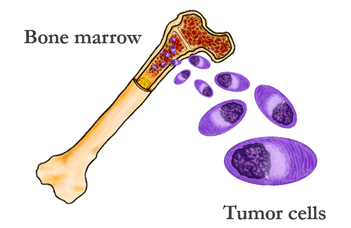Humoral Immunity, Immunobiotechnology Research Group
Head of the research group: Imre Kacskovics, DVM, PhD

Research concept
Our research aim is to establish cutting edge diagnostics for an oncohematological tumor, multiple myeloma. First, we analyse the patients’ bone marrow samples from the time of their diagnosis by next-generation sequencing (NGS). From these samples we identify the CDR3 sequences of the immunoglobulin variable regions (heavy and light chains) of the myeloma clones for each patient. This sequence uniquely identifies the tumor cells, just as a fingerprint. From the same patients we analyse blood samples using NGS following treatments for cancer, usually from remission status. In this test, we look for the presence or absence of the previously identified ’fingerprint’ CDR3 sequence specific for each patient. In order to increase the reliability of the more challenging circulating cell-free DNA analysis from plasma, we design gene assays for droplet digital PCR (ddPCR) which target the patient-specific myeloma CDR3 „fingerprint” sequences. These methods are among the most sensitive ones for molecular monitoring of the disease according to the literature, so they can be valuable tools in clinical decision making on the course of therapy – e.g. when to stop or continue certain treatments.
DNA-based monitoring methods are on the rise in developed countries, for example in the USA the FDA already approved a service based on this principle (Adaptive Biotechnologies: clonoSEQ). In case of successful establishment and registration, we plan to provide a molecular biomarker service which can complement the recent methods to allow for a more efficient treatment of multiple myeloma. Based on a medical economics pricing evaluation (professor Zoltán Kaló and colleagues, ISPOR 2020) there is potentially a significant financial benefit from the utilization of this method. We plan to provide this service at the accredited molecular biomarker laboratory which will be realized by the ELTE Biotechnology FIEK.
Collaborations
- Central Hospital of Southern Pest, National Institute of Hematology and Infectious Diseases – clinical knowledge and background, providing multiple myeloma blood and bone marrow samples
- Semmelweis University, 1st Department of Pathology and Experimental Cancer Research, Molecular Oncohematology Research Group – circulating cell-free DNA analysis, ddPCR analysis
Research services
- For research purposes, we can analyse human B cell-containing samples by next-generation sequencing (NGS) of the B cell receptor repertoire. We extract DNA from the samples, prepare immunoglobulin-specific sequencing libraries, and organize the sequencing as an external service. We analyse the sequencing data by our own bioinformatics pipeline.
- We can design unique droplet digital PCR (ddPCR) assays which target the unique immunoglobulin gene rearrangements previously identified by the NGS analyses. We do the ddPCR measurements and data evaluation in collaboration.
Human resources
- Imre Kacskovics, DVM, PhD, professor
- Bence Szikora, PhD-candidate
- Anita Marx, PhD-student
- Magdolna Osváth, MSc-student
Relevant publications of the research group
- Nagy Ákos, Bátai Bence, Kiss Laura, Marx Anita, Pinczés László Imre, Papp Gergő, Kacskovics Imre, Alpár Donát, Bödör Csaba. (2020) Folyadékbiopszia-vizsgálatok alkalmazási lehetőségei az onkohematológiában, Hematológia–Transzfuziológia, 5. évfolyam 3. szám 144-156
- Szikora B, Marx A, Jani PK, Pipek O, Müller V, Csabai I, Kacskovics I. FcRn Overexpression Expands Diversity of the Humoral Immune Response in bFcRn Transgenic Mice. Front. Immunol. 2020 Aug 21;11:1887.
- Kaló, Zoltán ; Vályi-Nagy, István ; Szekely, A. ; Szikora, Bence ; Bendes, R. ; Varga, G. ; Szilberhorn, Lászó ; Nagy, Balázs ; Mikala, Gábor ; Kacskovics, Imre PPM6 early phase economic evaluation of new generation sequence diagnostics in multiple myeloma. Value in Health 23 : Supplement 1 pp. S326-S327. (2020)
Funding
- April 2017. – September 2018. and from April 2021.: FIEK_16-1-2016-0005 (ELTE Biotechnology FIEK – Molecular Biomarker Research and Service Centre)
- October 2018. – March 2021.: ELTE Thematic Excellence Programme 2020 – TKP2020-IKA-05 (earlier: ELTE Institutional Excellence Program – NKFIH-1157-8/2019-DT)


